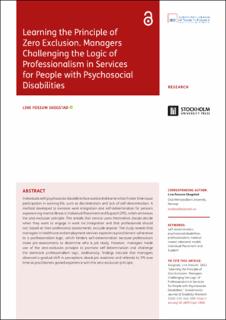Learning the Principle of Zero Exclusion. Managers Challenging the Logic of Professionalism in Services for People with Psychosocial Disabilities
Peer reviewed, Journal article
Published version
Permanent lenke
https://hdl.handle.net/11250/3109858Utgivelsesdato
2023Metadata
Vis full innførselSamlinger
- Publikasjoner fra Cristin [3269]
- SPS - Documents [424]
Originalversjon
Scandinavian Journal of Disability Research. 2023, 25 (1), 431-444. 10.16993/sjdr.1008Sammendrag
Individuals with psychosocial disabilities face substantial barriers that hinder their equal
participation in working life, such as discrimination and lack of self-determination. A
method developed to increase work integration and self-determination for persons
experiencing mental illness is Individual Placement and Support (IPS), which embraces
the zero-exclusion principle. This entails that service users themselves should decide
when they want to engage in work (re-)integration and that professionals should
not, based on their professional assessments, exclude anyone. The study reveals that
managers in healthcare and employment services experience practitioners’ adherence
to a professionalism logic, which hinders self-determination because professionals
make pre-assessments to determine who is job ready. However, managers made
use of the zero-exclusion principle to promote self-determination and challenge
the dominant professionalism logic. Additionally, findings indicate that managers
observed a gradual shift in perceptions about job readiness and referrals to IPS over
time as practitioners gained experience with the zero-exclusion principle

